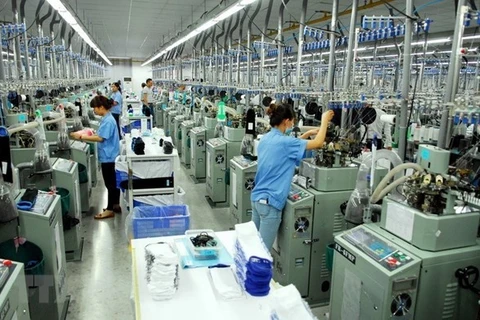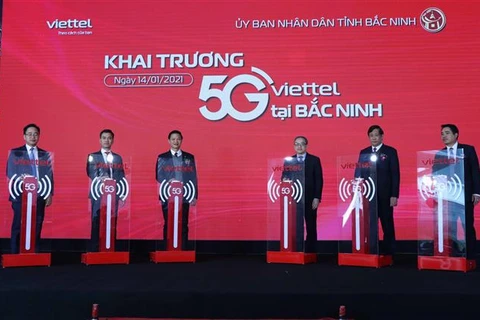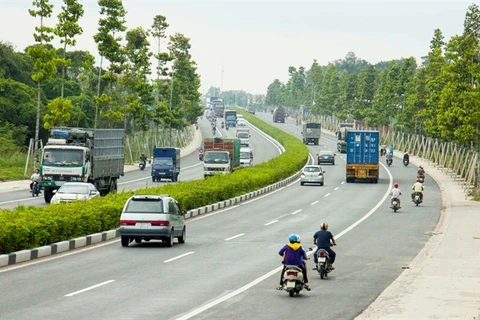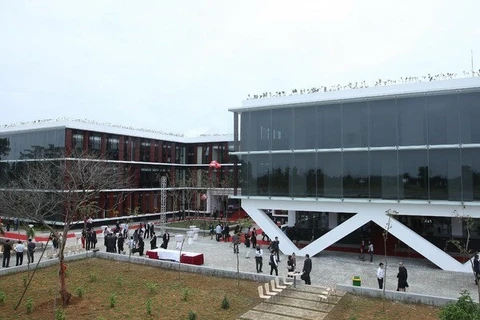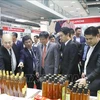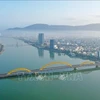Hai Phong (VNS/VNA) - Vietnam has witnessed an increase in the arrival of global high-tech brands like Pegatron, Universal Scientific Industrial, Foxconn.
This shows investors are increasingly becoming vocal about their interest in partnering with companies that take sustainability seriously.
It is these industry leaders who are driving a movement as they look for a partner that matches their same sustainable outlook and goals.
As a result, local businesses in Vietnam, and industrial park developers in particular, are transforming their business model as well as adapting to international standards to attract these “eagles”. Although it can be tricky for industrial parks to balance profitability, concern for environment, and social commitments, there are still multiple ways they can do to stay sustainable.
In 2020, the “Eco-industrial Park Intervention in Vietnam – Perspective from the Global Eco-Industrial Parks Programme” project was launched in Ho Chi Minh City by the Ministry of Planning and Investment (MPI) and the United Nations Industrial Development Organisation (UNIDO).
At the workshop, five industrial parks across the country were chosen to implement eco-industrial park initiatives. The project will be carried out in a period of three years with an aim to establish a more sustainable industrial park model and pave the way to the replication of this model across Vietnam in the future.
One of the five pilot industrial parks is DEEP C Hai Phong I (also known as Dinh Vu Industrial Zone), the first footprint of DEEP C group in Vietnam. The industrial park cluster has gained a reputation as the only European-managed industrial park in Vietnam, with compatible European quality in all business aspects, from general infrastructures, utilities supply to park operations. Located in Hai Phong City and Quang Ninh province, DEEP C Industrial Zones is the northern representative of the project.
Long before the recent selection, DEEP C implemented their environmental sustainability strategy on four pillars: power, water, waste, and green zone. The main goal is taking the complexity out of investing in Vietnam while achieving common sustainability goals with investors. Overall, the strategy is to drive economic growth in a sustainable manner for DEEP C, investors and local community.
Depending on the nature of each industrial park, the developers can adopt different practices to stay sustainable. For DEEP C, they are the first industrial park to make a road from recycled plastics and a smart electricity grid possible in Vietnam. The recycled plastics road currently lies in DEEP C Hai Phong II Industrial Park in Hai Phong. More asphalt roads using recycled plastic will be stretched out all over DEEP C Industrial Zones as an innovative solution to address plastics waste and advance circular economy in Vietnam.
The group is now working on the generation of renewable energy from rooftop solar panel and wind turbine. By 2030, it aims to supply 50 percent of energy demand within its industrial park. Sustainability is also present in reusing of treated wastewater for various industrial purposes such as cooling tower of tenants, preserving mangrove forest along our port area as a natural buffering.
Construction work comply with strict standards on safety and environment before, during and after construction such as innovation (road made from plastics), sustainable sourcing of materials (containers), sustainable sites, energy efficiency (optimising solar and wind energy), indoor environment quality and water efficiency. In the years to come, DEEP C’s ready-built factories will be designed in the most nature-friendly way possible with LEED standards.
“We believe that eco-industrial park is the future of the industry and are happy to raise the standards for developing infrastructures inside industrial park and spread the benefits of eco manufacturing," said Koen Soenens, General Sales and Marketing Director at DEEP C Industrial Zones.
"Sure it’s good for the environment, but it’s also good for the image, the quality of working and living, and it’s cost-saving for the maintenance and operations.”
DEEP C Industrial Zones launched its base in Hai Phong City, Vietnam in 1997 with the development project of Dinh Vu Industrial Zone (nowadays known as DEEP C Hải Phòng I), a collaboration between Belgian group Rent-A-Port and Hai Phong People’s Committee.
Over the past 23 years, DEEP C has evolved to be one of the largest industrial park developers in Vietnam with five sub-zones covering 3,400 ha of industrial land, forming an industrial cluster in Hai Phong City and Quang Ninh province – the most dynamic growing region in the northern region.
To date, DEEP C Industrial Zones are home to 120 projects with a total investment of 4 billion USD, backed by multinational companies like Bridgestone, Idemitsu, Knauf, Chevron, tesa./.
It is these industry leaders who are driving a movement as they look for a partner that matches their same sustainable outlook and goals.
As a result, local businesses in Vietnam, and industrial park developers in particular, are transforming their business model as well as adapting to international standards to attract these “eagles”. Although it can be tricky for industrial parks to balance profitability, concern for environment, and social commitments, there are still multiple ways they can do to stay sustainable.
In 2020, the “Eco-industrial Park Intervention in Vietnam – Perspective from the Global Eco-Industrial Parks Programme” project was launched in Ho Chi Minh City by the Ministry of Planning and Investment (MPI) and the United Nations Industrial Development Organisation (UNIDO).
At the workshop, five industrial parks across the country were chosen to implement eco-industrial park initiatives. The project will be carried out in a period of three years with an aim to establish a more sustainable industrial park model and pave the way to the replication of this model across Vietnam in the future.
One of the five pilot industrial parks is DEEP C Hai Phong I (also known as Dinh Vu Industrial Zone), the first footprint of DEEP C group in Vietnam. The industrial park cluster has gained a reputation as the only European-managed industrial park in Vietnam, with compatible European quality in all business aspects, from general infrastructures, utilities supply to park operations. Located in Hai Phong City and Quang Ninh province, DEEP C Industrial Zones is the northern representative of the project.
Long before the recent selection, DEEP C implemented their environmental sustainability strategy on four pillars: power, water, waste, and green zone. The main goal is taking the complexity out of investing in Vietnam while achieving common sustainability goals with investors. Overall, the strategy is to drive economic growth in a sustainable manner for DEEP C, investors and local community.
Depending on the nature of each industrial park, the developers can adopt different practices to stay sustainable. For DEEP C, they are the first industrial park to make a road from recycled plastics and a smart electricity grid possible in Vietnam. The recycled plastics road currently lies in DEEP C Hai Phong II Industrial Park in Hai Phong. More asphalt roads using recycled plastic will be stretched out all over DEEP C Industrial Zones as an innovative solution to address plastics waste and advance circular economy in Vietnam.
The group is now working on the generation of renewable energy from rooftop solar panel and wind turbine. By 2030, it aims to supply 50 percent of energy demand within its industrial park. Sustainability is also present in reusing of treated wastewater for various industrial purposes such as cooling tower of tenants, preserving mangrove forest along our port area as a natural buffering.
Construction work comply with strict standards on safety and environment before, during and after construction such as innovation (road made from plastics), sustainable sourcing of materials (containers), sustainable sites, energy efficiency (optimising solar and wind energy), indoor environment quality and water efficiency. In the years to come, DEEP C’s ready-built factories will be designed in the most nature-friendly way possible with LEED standards.
“We believe that eco-industrial park is the future of the industry and are happy to raise the standards for developing infrastructures inside industrial park and spread the benefits of eco manufacturing," said Koen Soenens, General Sales and Marketing Director at DEEP C Industrial Zones.
"Sure it’s good for the environment, but it’s also good for the image, the quality of working and living, and it’s cost-saving for the maintenance and operations.”
DEEP C Industrial Zones launched its base in Hai Phong City, Vietnam in 1997 with the development project of Dinh Vu Industrial Zone (nowadays known as DEEP C Hải Phòng I), a collaboration between Belgian group Rent-A-Port and Hai Phong People’s Committee.
Over the past 23 years, DEEP C has evolved to be one of the largest industrial park developers in Vietnam with five sub-zones covering 3,400 ha of industrial land, forming an industrial cluster in Hai Phong City and Quang Ninh province – the most dynamic growing region in the northern region.
To date, DEEP C Industrial Zones are home to 120 projects with a total investment of 4 billion USD, backed by multinational companies like Bridgestone, Idemitsu, Knauf, Chevron, tesa./.
VNA

